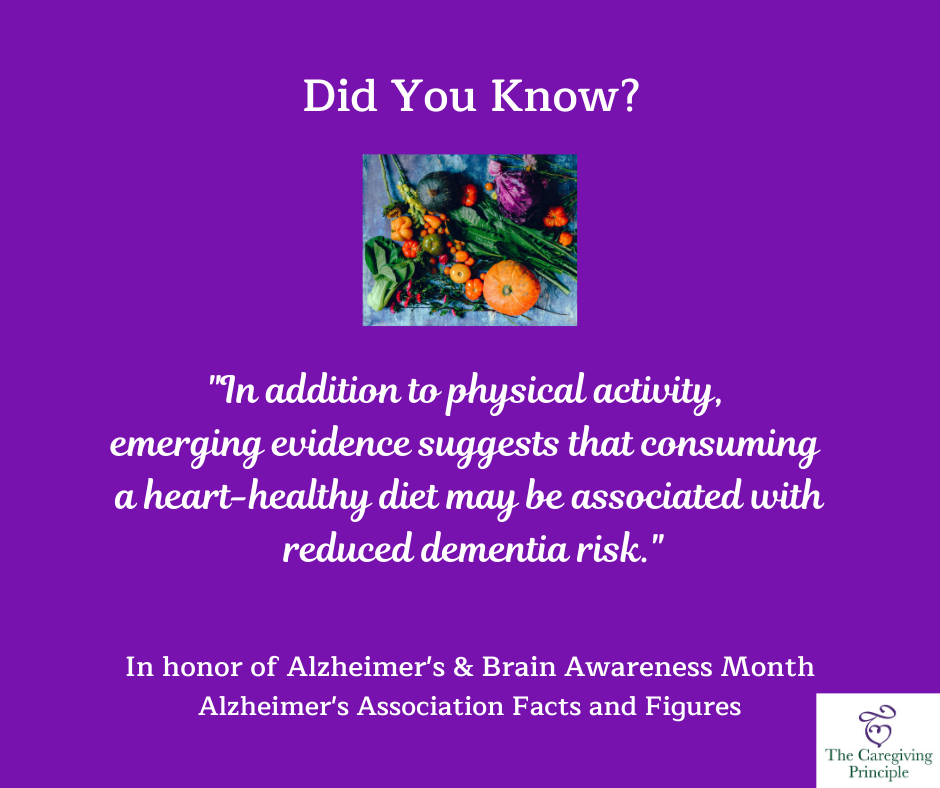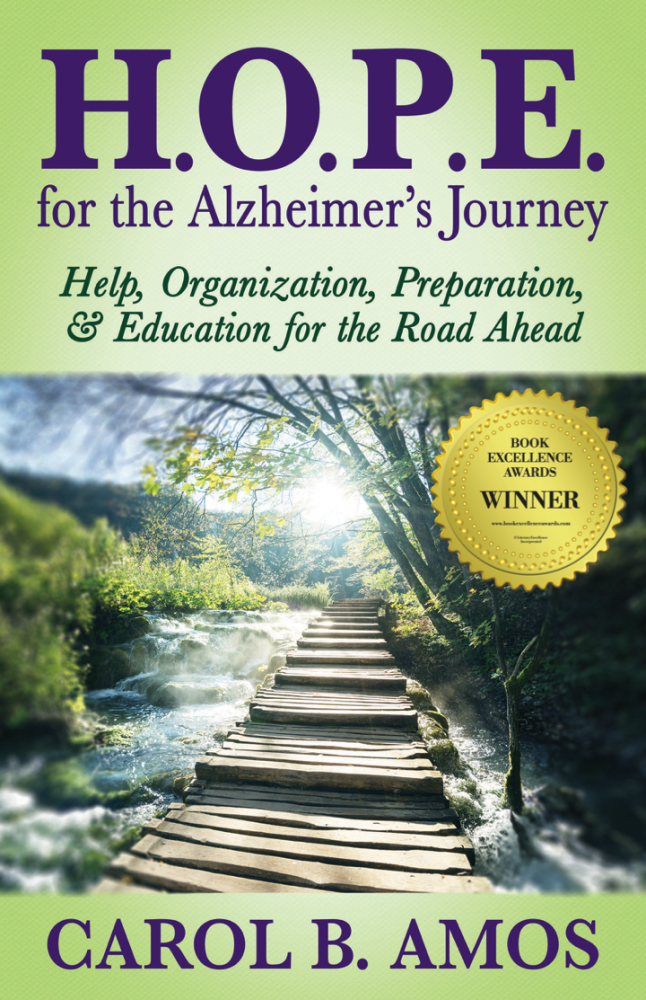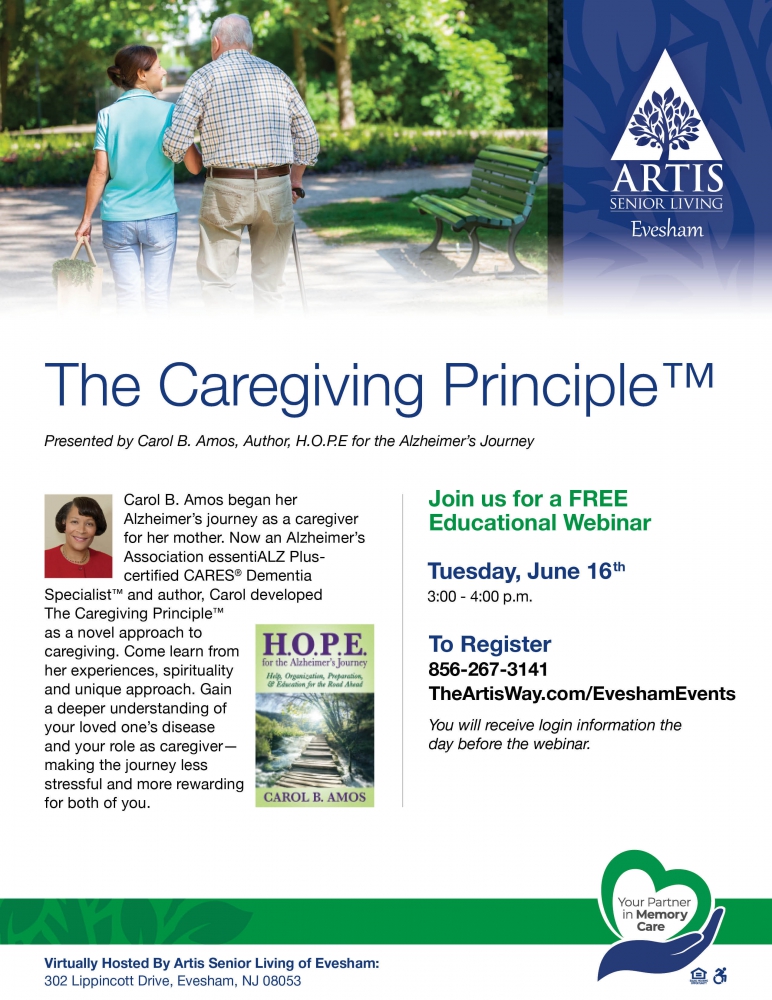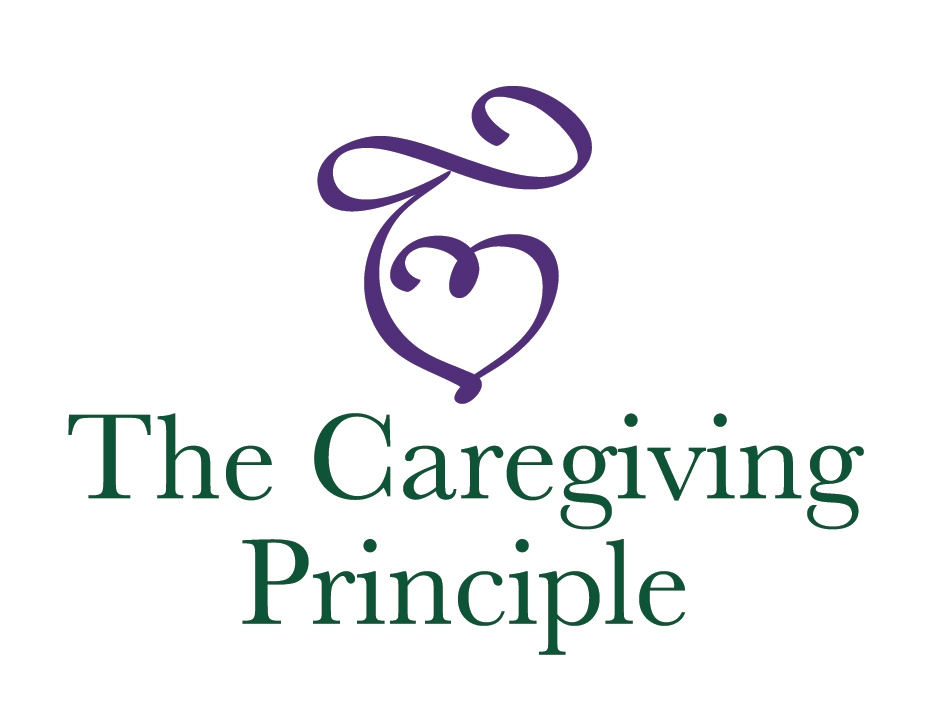THE CAREGIVING PRINCIPLE®:
HELPING CAREGIVERS MEET THE NEEDS OF THEIR LOVED ONE DURING COVID-19
Alzheimer's & Brain Awareness Month
 June is Alzheimer's & Brain Awareness Month. I am presenting the H.O.P.E. “Did You Know?” series to increase awareness daily during this month. These social media posts include useful information and statistics from the Alzheimer’s Association’s Alzheimer’s Disease Facts and Figures report. Also this month, The Alzheimer’s Association is sponsoring a “Go Purple” campaign and I will share my story to also increase awareness about the disease. The “Did You Know?” series and the “Go Purple” campaign can be found on my social media pages.
June is Alzheimer's & Brain Awareness Month. I am presenting the H.O.P.E. “Did You Know?” series to increase awareness daily during this month. These social media posts include useful information and statistics from the Alzheimer’s Association’s Alzheimer’s Disease Facts and Figures report. Also this month, The Alzheimer’s Association is sponsoring a “Go Purple” campaign and I will share my story to also increase awareness about the disease. The “Did You Know?” series and the “Go Purple” campaign can be found on my social media pages.
Please visit my social media pages at:
* LinkedIN at Carol B. Amos
* Facebook @hopeforthealzheimersjourney
* Twitter @Carolbamos
H.O.P.E. for the Alzheimer’s Journey 
H.O.P.E. for the Alzheimer’s Journey: Help, Organization, Preparation, and Education for the Road Ahead has helped hundreds of caregivers have a less stressful, more rewarding journey. This award-winning caregiver guide has been reduced to $10 in honor of Alzheimer's & Brain Awareness Month on my website at www.carolbamos.com.
2020 Schedule
 Covid-19 has prevented Alzheimer’s support groups from meeting in person at a time when caregiver support is extremely critical. H.O.P.E. seminars are now presented online. Please contact me if you are interested in a seminar for your support group, church, conference, or workplace. Seminars include:
Covid-19 has prevented Alzheimer’s support groups from meeting in person at a time when caregiver support is extremely critical. H.O.P.E. seminars are now presented online. Please contact me if you are interested in a seminar for your support group, church, conference, or workplace. Seminars include:
* Alzheimer’s Disease Awareness
* This is my Caregiving Story
* H.O.P.E. for the Caregiver (current/future caregivers)
* Balancing Caregiving and Career (current/future caregivers)
* The Caregiving Principle® (dementia caregivers)
* Seven Steps to Prepare for the Caregiving Journey (current/future caregivers)
Please register for my next seminar presenting The Caregiving Principle® on June 16th sponsored by Artis Senior Living. Please visit my website for updates to my schedule.
The Caregiving Principle® : Helping Caregivers Meet The Needs Of Their Loved One During Covid-19
I along with my brothers Ronald and Michael were caregivers for our mother, Elizabeth Boyd  who lived with Alzheimer’s disease for over 11 years. We worked together extremely well as caregivers but sometimes encountered difficult situations with our mother. I analyzed these tenuous situations and developed The Caregiving Principle®, a framework for all caregivers.
who lived with Alzheimer’s disease for over 11 years. We worked together extremely well as caregivers but sometimes encountered difficult situations with our mother. I analyzed these tenuous situations and developed The Caregiving Principle®, a framework for all caregivers.
The Caregiving Principle®uses Maslow’s Hierarchy of Needs to define the needs of a person as physiological, safety, social, esteem, and self-actualization. Maslow states that if the physiological need (air, food, water, and sleep) of a person is not met, this deficiency will have a physical impact on the body (for example, dehydration, constipation). When the safety, social, and esteem needs are not met, the deficiency may affect the mind and behavior: “The body gives no physical indication, but the individual feels anxious and tense.” Caregivers can use The Caregiving Principle® to understand and meet the needs of their loved one especially during this covid-19 period.
Physiological Need: The physiological need is similar to activities of daily living (ADLs) a set of daily tasks needed for personal care. It includes transferring, toileting, bathing, dressing, eating, and sleeping. If covid-19 has impacted meeting some of these needs (closed day program, loss of outside help, etc.), caregivers should make changes to ensure that these needs are met. Exercise (walking), increased fruits and vegetables, and adequate sleep can help boost the immune system of everyone.
Safety Need: The need for safety according to Maslow encompasses “freedom from fear, from anxiety and chaos.” Routines and familiar people and surroundings provide a sense of security. Establish a daily routine. If your loved one was in a day program, try to mimic that routine of eating, mental exercise, physical exercise, and entertainment. Avoid having your loved one watch the news even if it was part of their routine. Guard your phone conversations. Remain upbeat and positive to help your loved one feel safe.
Caregivers must do everything reasonably possible to prevent exposure to covid-19. My husband is at higher risk because of his age. He has stayed at home. We both have had online doctor and other appointments. I only go out once a week for food and supplies. I leave non-perishable items in the garage for a few days and decontaminate everything that comes into our house, including food, mail, and newspapers. I think of myself and everyone and everything around me as a carrier of covid-19.
This is an extremely difficult time for caregivers concerned for their loved one in a quarantined facility. Speak with the staff regularly. Understand their policies. Speak with the families of other residents. Take advantage of Facetime calls or entranceway visits. Send cards with family pictures if allowed by the facility to help meet the social need.
Social Need: The social need is the need for belonging, love, and affection. If this need is not met, the person will experience feelings of alienation, strangeness, and loneliness. This is one of the most difficult needs to meet during this period of social distancing and quarantine. Let your loved one know how much you love them and appreciate having them in your life. Look at family pictures and reminisce. Call and/or Facetime family and friends, or go for a walk or car ride. There are many online concerts and museum tours that your loved one may be interested in. Identify small projects. I recently planted gladiolus bulbs with the thought that the quarantine will be over when they bloom.
Esteem Need: The esteem need is defined as a “desire for a high evaluation of themselves for self-respect or self-esteem, and for the esteem of others.” Continue the grooming routine even though your loved one may not leave home. Continue to treat your loved one with dignity and respect. Ask for their advice. Give them positions of respect by asking them to bless the food or by serving them first. Let them make some decisions, “Would you like to go for a walk or listen to some music?” The news and restrictions imposed by covid-19 can easily frustrate a caregiver but do not take your frustration out on your loved one. Stop and regroup. Go to a different room, play some music, meditate, or call a friend. We will all get through this.
Self-Actualization Need: Self-actualization, defined as man’s desire for self-fulfillment or accomplishing what a person is capable of becoming. Let your loved one do all that he is capable of doing. It may take longer or may not be exactly the way you would do it, but give them an opportunity to contribute. Try some new activities. I just bought a kite from the dollar store and putting it together and trying to keep it airborne was different and entertaining.
Caregivers can have a less stressful, more rewarding experience during covid-19 by understanding and trying to meet the physiological, safety, social, esteem, and self-actualization need of their loved one.
TAKE CARE OF YOURSELF
WHAT WOULD IT TAKE?
Carol B. Amos
11/23/2024
SPREADING H.O.P.E. AND THE CAREGIVING PRINCIPLE®
Carol B. Amos
3/10/2023
THE CAREGIVING PRINCIPLE® RECEIVES A MAUDE’S AWARD
Carol B. Amos
9/16/2021
THE CAREGIVING PRINCIPLE®: MAXIMIZING THE CAPABILITY OF A LOVED ONE WITH DEMENTIA BENEFITS EVERYONE
Carol B. Amos
7/8/2021
THE CAREGIVING PRINCIPLE®: PREPARING FOR THE NEXT PHASE OF THE JOURNEY
Carol B Amos
5/5/2021
SPREADING THE MESSAGE OF H.O.P.E.
Carol B Amos
2/22/2021
H.O.P.E. New Years' Sale
Carol B Amos
12/29/2020
SAYING GOODBYE TO 2020
Carol B Amos
12/3/2020
H.O.P.E. - Winner of the Today’s Caregiver Friendly Award
Carol B. Amos
9/17/2020
THE CAREGIVING PRINCIPLE®: HELPING CAREGIVERS MEET THE NEEDS OF THEIR LOVED ONE DURING COVID-19
Carol B. Amos
6/1/2020
CAREGIVING DURING COVID-19
Carol B. Amos
4/10/2020
HONORING ELIZABETH
Carol B. Amos
1/14/2020
NATIONAL FAMILY CAREGIVERS MONTH
Carol B. Amos
11/28/2019
CAREGIVING EXCELLENCE
Carol B. Amos
8/15/2019
H.O.P.E. for the Alzheimer’s Journey is Now Available
Carol B. Amos
10/26/2018
ALZHEIMER'S CARE GIVING AT CHRISTMAS
Carol B. Amos
12/3/2017
YOU ARE NOT ALONE
Carol B. Amos
9/3/2017
REDUCING RISK FACTORS FOR ALZHEIMER’S DISEASE
Carol B. Amos
6/4/2017
DO YOU SNORE?
Carol B. Amos
2/5/2017